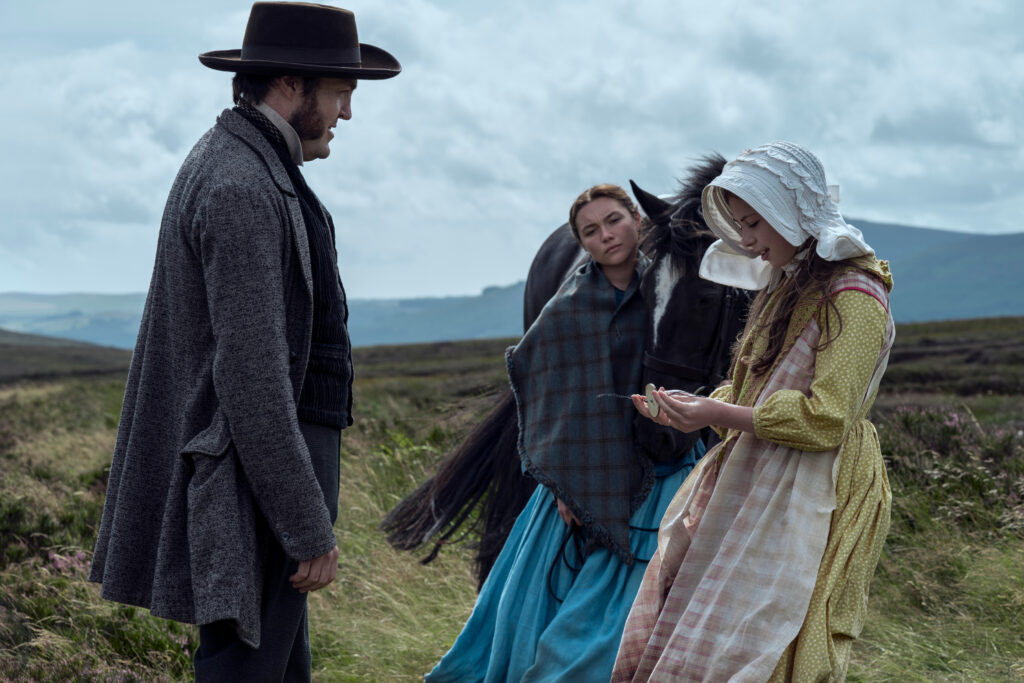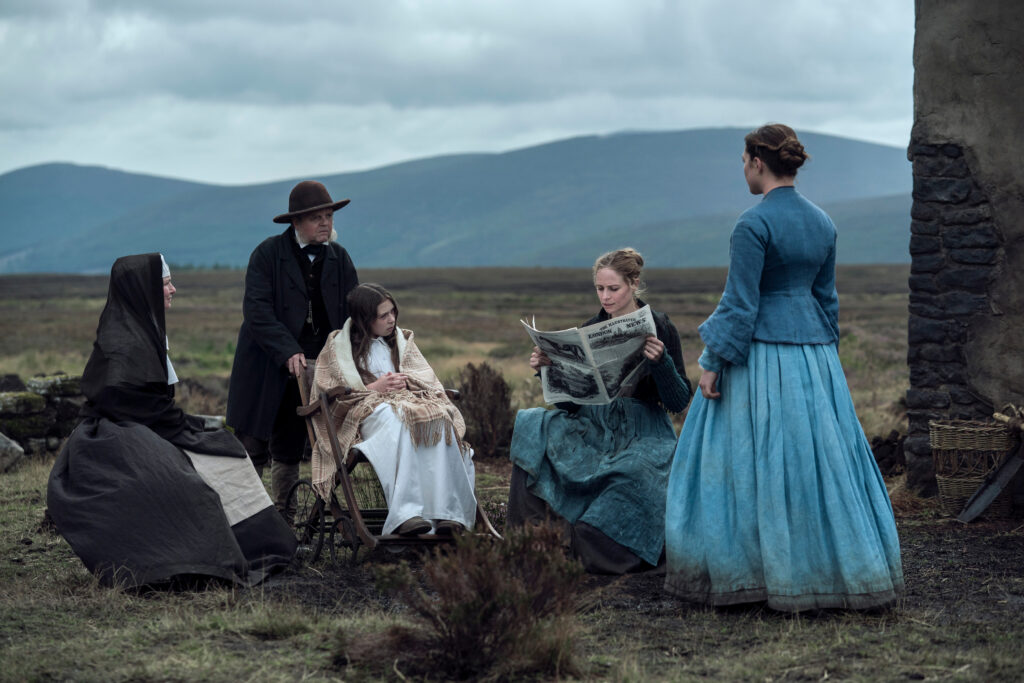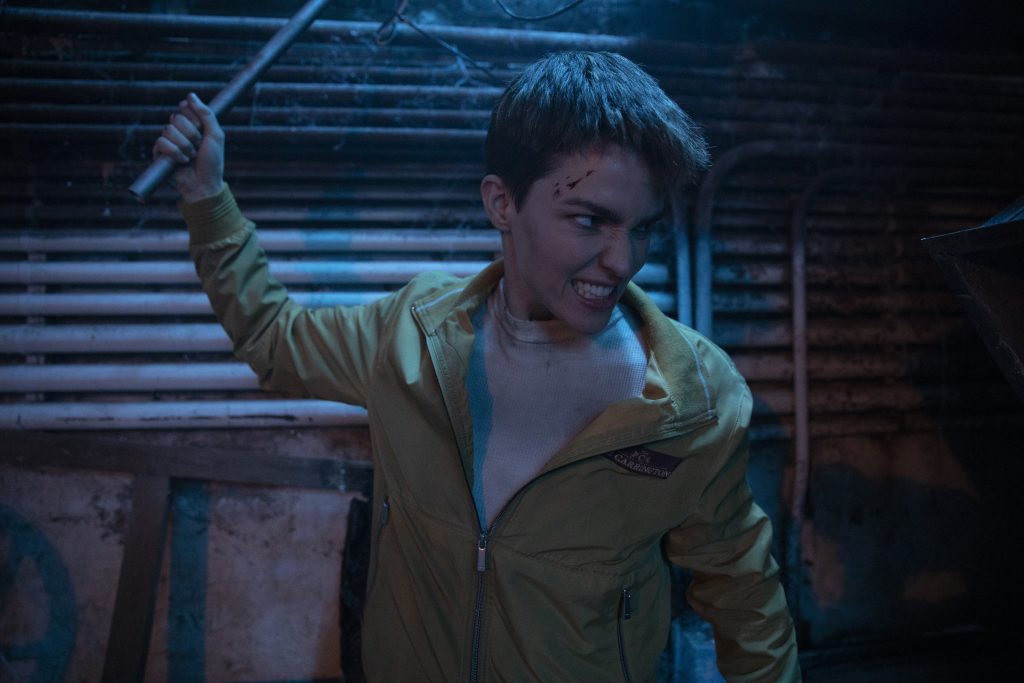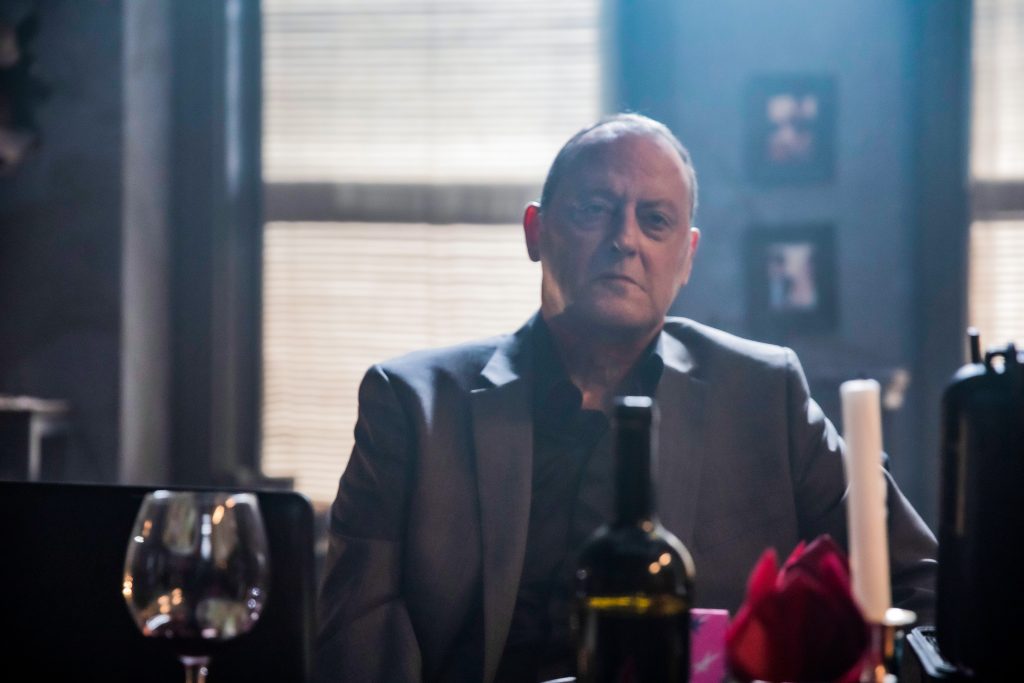November 16, 2022
by Carla Hay

Directed by Sebastián Lelio
Culture Representation: Taking place in 1862 in the Midlands of Ireland, the dramatic film “The Wonder” features an all-white cast of characters representing the working-class and middle-class.
Culture Clash: A Nightingale nurse from England is hired to go to Ireland to find out the reason why an 11-year-old girl has reportedly been able to survive for four months without eating and without any signs of starvation.
Culture Audience: “The Wonder” will appeal primarily to people who are fans of star Florence Pugh and movies that make pointed observations about how religion can control and influence people’s lives.

“The Wonder” will test the patience of viewers with short attention spans, but the movie’s subtlety, nuances and Florence Pugh’s standout performance are great rewards for people who want to see a drama about religion and moral hypocrisy. This is the type of movie where some of the biggest revelations don’t happen in loud, bombastic moments but occur in hushed tones and whispers that are sometimes engulfed in shame.
Directed by Sebastián Lelio, “The Wonder” is based on Emma Donoghue’s 2016 novel of the same name. Lelio, Donoghue and Alice Birch co-wrote the adapted screenplay for “The Wonder.” Although the movie is set in a rural Irish community in 1862, many of the themes in “The Wonder” transcend time and location and can apply to the past, present and future of any community where religion is the driving force of how people live. “The Wonder” had its world premiere at the 2022 Telluride Film Festival, and then had its Canadian premiere at the 2022 Toronto International Film Festival.
The beginning of “The Wonder” has an unusual location of a movie set of props where no one is present, but viewers can hear this voiceover saying: “This is the beginning of a film called ‘The Wonder.’ The people you are about to meet, the characters believe in their stories with complete devotion.” The camera then moves from the prop-filled set to a movie-set replication of the inside of train, as the story begins and transports viewers back to the year 1862.
On the train is the central protagonist of “The Wonder”: Lib Wright (played by Pugh), a Nightingale nurse from England, who is traveling by herself to the Midlands of Ireland. A devoutly Catholic community (which is unnamed in the movie) has hired Lib to watch over an 11-year-old girl named Anna O’Donnell (played by Kíla Lord Cassidy), who has been in the news for being a “miracle girl.” Anna has reportedly not eaten for the past four months and has no signs of starvation or any weight loss.
Lib is a compassionate and strong-willed nurse who is very skeptical that Anna hasn’t eaten any food for the past four months. When she arrives at the boarding house where she’ll be staying, she finds out that she has to share a room with a nun named Sister Michael (played by Josie Walker), who will be sharing the work shift duties of watching over Anna. When Lib expresses some disappointment that she will have to share a room with a nun, instead of having her own room, the boarding house’s matriarch Mrs. Maggie Ryan (played by Ruth Bradley) quips, “Welcome to Ireland.”
In her first meal at the Ryan family home, Lib is polite, observant and somewhat guarded about herself. The Ryan family consists of Maggie; her husband, Sean Ryan (played by David Wilmot), who works as a publican; and their five daughters (played by Darcey Campion, Abigail Coburn, Carla Hurley O’Dwyer, Juliette Hurley O’Dwyer and Carly Kane). Maggie tells Anna that the eldest four daughters are Sean’s daughters from his marriage to his first wife, who is now deceased. The youngest daughter is the biological child of Sean and Maggie.
Sean is on a five-man committee overseeing Lib and Sister Michael in the women’s job of observing Anna. The other men on the committee are Dr. McBrearty (played by Toby Jones), Father Thaddeus (played by Ciarán Hinds), landowner John Flynn (played by Brian F. O’Byrne), and Baronet Sir Ottway (played by Dermot Crowley). Dr. McBrearty is the most outspoken of the five men and is the one who’s most likely to give orders. It should come as no surprise that independent-minded Lib will clash with Dr. McBrearty the most.
In Lib’s first meeting in front of the committee, she is adamantly told that her job is to observe and talk to Anna and do nothing else. Lib is not allowed to give Anna any food, water or medical attention. Lib is concerned and uncomfortable with this command, but Dr. McBrearty reminds Lib that she’s being paid a considerable amount of money to do whatever the committee tells her to do. Lib is told that after 15 days, Lib and Sister Michael will be required to give separate testimonial reports about what they each believe is the cause of Anna’s seemingly miraculous condition.
When Lib meets the O’Donnell family, she finds a deeply religious clan who’s emotionally haunted by the death of Anna’s older brother Pat, who passed away nine months earlier. A recent photo of Pat in the family home shows that he was about 15 years old. Pat’s cause of death is never fully explained, but it’s described in the movie as being a sudden death.
Anna’s parents Rosaleen O’Donnell (played by Elaine Cassidy) and Malachy O’Donnell (played by Caolán Byrne) appear to be humble and unassuming. Rosaleen is very devoted and nurturing to Anna, whom Rosaleen calls “a jewel, a wonder.” However, Lib can’t help but notice that Anna’s parents accept money from people who want to see this “miracle girl” up close. Lib thinks this practice is distasteful, and she sometimes sends these visitors away because Lib is more concerened about Anna’s health.
The O’Donnells have a housekeeper named Kitty (played by Niamh Algar), who is in her 20s, and who has recently started learning how to read. Kitty might not have a lot of formal education, but she is very knowledgeable about her surroundings and the people in the community. Kitty is usually the one to tell Lib some of the personal backgrounds of the people in the community. In other words, Kitty knows a lot more than people think she does.
As for Anna, she’s a mostly quiet child who will answer any questions about her condition by saying that it’s all coming from God. When Lib asks Anna how she’s been able to not have any physical effects of not eating, Anna insists that she’s getting “manna from heaven.” Lib asks, “How does it feel?” Anna replies, “Full.” That’s not a good-enough answer for Lib, who is very doubtful that Anna has not eaten anything for the past four months. Lib is determined to find out why.
Someone else who wants to get to the bottom of this mystery is Will Byrne (played by Tom Burke), a reporter for the Daily Telegraph in England. Will is visiting this community to investigate, so it’s inevitable that Lib meets Will. Kitty tells Lib that Will grew up in the community but moved to England for his university education and to pursue a career in journalism. According to Kitty, Will’s parents were so heartbroken that he left Ireland and didn’t keep in touch with them, so his parents locked themselves in their home and starved themselves to death during the Great Famine.
The Great Famine, which devastated Ireland from 1845 to 1849, resulted in about 100,000 people dying from starvation and disease, stemming from blighted potato crops that also caused an economic crisis. The village where the O’Donnells live was hit hard by the Great Famine, which is why Anna’s seemingly miraculous starvation survival has a particularly emotional resonance in this religious community. The voiceover in the beginning of the movie comments: “The Great Famine casts a long shadow, and the Irish hold the English responsible for all that devastation.”
It doesn’t take long for Lib to become frustrated by her employers’ orders not to help Anna in any way. One night, when she’s off-duty and hanging out at Sean’s pub, she angrily asks him: “What kind of backwards village imports a professional nurse for something like this?” Sean responds with equal ire and says to Lib, “Prove it’s nonsense, and then fuck off [and go] home.”
There’s some underlying tension between the Irish villagers and anyone they consider to be an “outsider,” especially those from England. Will, who has now made England his home, experiences a certain amount of mistrust from the villagers too, because Will is considered somewhat of a “traitor” to abandon his Irish home to move to England. At first, Will and Lib seem to be in hostile competition to find out what’s going on with Anna, but Lib and Will eventually discover that they actually like each other, and they bond over their “outsider” status in this village.
And who exactly is Lib? She slowly reveals information about herself to certain people. Viewers find out that she served in the Crimean War. After the war, she was married to a man who disappeared and is presumed dead. And she is in deep emotional pain over the death of her baby daughter, who passed away at three weeks old. Lib later confides in Anna that Lib’s husband left Lib shortly after the death of their child.
When Lib is alone in her room, she takes out a towel that has a pair of baby booties and some liquid opium. She has a secret self-harming ritual of getting high by drinking the opium and pricking an index finger until she sees blood. She then sucks the blood so that no stains appear anywhere. When Anna shows Lib a bloody tooth that has fallen out of Anna’s mouth, Lib wonders if Anna is also engaging in self-harm.
Observant viewers will notice that it’s mentioned early on in the movie that Anna has stopped eating since her 11th birthday. “The Wonder” has recurring themes and references to being reborn and people going through different transitions of life and death. Certain people in the story are obsessed with who is going to heaven or hell and who might be stuck in purgatory.
Lib, whose birth name is Elizabeth, is asked by Anna if she likes to call herself by any other names, such as Elizabeth, Beth or Liz. Later, after Lib reveals something about herself, Lib will ask Anna if she could be another person, what her name would be. Anna says she would choose the name Nan.
“The Wonder” often reflects the slow pace of a rural village, so this movie might be too sluggish for some viewers. However, the performances of the cast members are admirable, while the mystery of Anna’s condition can keep viewers curious enough to find out what will happen next and how the movie will end. Pugh is a solid anchor for “The Wonder,” which is not a movie that has her flashiest, awards-bait role, but it’s testament to how talented she is that her portrayals of various characters seem so natural.
Even though Pugh performs the role of Lib in an authentic way, others part of the “The Wonder” have a few authenticity flaws and disappointments. For example, this community is ruled by the teachings of the Catholic Church, but “The Wonder” inexplicably does not show enough of Father Thaddeus’ influence on this community. Father Thaddeus is a mostly silent member of the committee that is supervising Lib and Sister Michael. It’s an unfortunate waste of the talent of Oscar-nominated actor Hinds.
Lib also does something very dangerous toward the end of “The Wonder.” And how it’s staged in the movie looks rushed and somewhat hard to believe. The movie doesn’t deviate from the book in what happens, but the cinematic version of this conclusion seems crammed quickly into a movie that took its time to linger on other less meaningful parts of the story. These flaws are minor and don’t ruin “The Wonder,” which is a distinctive psychological drama that effectively portrays the conflicts that can occur between comforts of religious faith and the discomforts of harsh reality.
Netflix released “The Wonder” in select U.S. cinemas on November 2, 2022. The movie premiered on Netflix on November 16, 2022.


